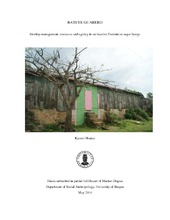| dc.description.abstract | This thesis is about a sugarcane bateye situated in the inland province of Monte Plata in the Dominican Republic: Bateye Guarero. A bateye is an agricultural community in the midst of the sugarcane fields, created by the sugarcane companies to house the agricultural workers. The Dominican state sugarcane company went bankrupt towards the end of the 1990ies and left Bateye Guarero and other bateye communities without income, social services or aid. Most of the sugarcane workers were Haitian nationals and their children born in the Dominican Republic. Anti- Haitian sentiments have strong precedence in the country, and were in the past century institutionalized as a State discourse called antihaitianismo. This thesis explores the identity-management of the inhabitants of Bateye Guarero as they attempt to negotiate with national forces over social identification and resources. With the analytical basis of Jenkins' concept of Power of efficacy (2009) this thesis analyses the connection between mobilization and maintenance of resources and identity-management. The main argument in this thesis is that identity- management in Bateye Guarero is shaped by how resources can be mobilized in the pursuit of perceived upward social mobility. It is argued that the likelihood of surpassing the social stigma connected to Haitian identification grows the more resources that can be mobilized for practices that Dominicanize". Simultaneously, it is argued that poorer access to resources finds its expression in alternative identity-management that does not center on Dominicanizing" practices, but emphasize other social identifications. The thesis also reflects on possible changes to identity-management in Bateye Guarero due to a Constitutional ruling of September 2013 declaring that children born to parents in transit" are not eligible for Dominican citizenship, which includes the children of Haitian sugarcane-cutters. | en_US |
